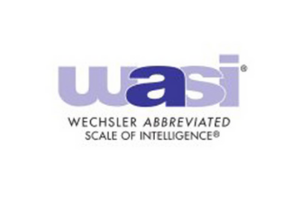David Wechsler
Overview:Obtain a reliable brief measure of intelligence
Age Range:Individuals 6:0–89:11
Scoring Option:Manual scoring
RTI Tiers:RTI Levels 2 and 3
Completion Time:Four-subtest form, 30 minutes; Two-subtest form, 15 minutes
Scores/Interpretation:VIQ, PIQ, and FSIQ scores
Publication Date:1999
The WASI-II is now available!
Save time and obtain accurate results with the Wechsler Abbreviated Scale of Intelligence™ (WASI™). The WASI meets the demand for a quick, reliable measure of intelligence in clinical, educational, and research settings. The WASI is nationally standardized, yields the three traditional Verbal, Performance, Full Scale IQ scores, and is linked to the Wechsler Intelligence Scale for Children®—Fourth Edition (WISC–IV®), and the Wechsler Adult Intelligence Scale®—Third Edition(WAIS®–III). The WASI provides you with more information than you can typically receive from other brief intelligence tests.
Links to WISC–IV, WAIS–III
The WASI was developed as an independent scale. Standardization data were collected from a large nationally repre- sentative sample of children and adults from 6 to 89 years. Research data link the WASI with WISC–IV and WAIS–III in order to increase its clinical utility. This linkage lets you estimate a range of FSIQ scores on the comprehensive batteries.
Four-Subtest and Two-Subtest Forms
The WASI consists of four subtests: Vocabulary, Similarities, Block Design, and Matrix Reasoning. The four-subtest form can be administered in just 30 minutes and results in VIQ, PIQ, and FSIQ scores. The VIQ score, a measure of crystallized abilities, is provided by two types of measures: the Vocabulary subtest for measuring word knowledge, verbal concept formation, and fund of knowledge, and the Similarities subtest for measuring verbal reasoning and concept formation. The PIQ score is provided by two different types of performance measures: Matrix Reasoning for measuring visual information processing and abstract reasoning skills, and Block Design for measuring the ability to analyze and synthesize abstract visual stimuli, nonverbal concept formation, visual perception and organization, simultaneous processing, visual-motor coordination, learning, and the ability to separate figure and ground in visual stimuli.
An estimate of general intellectual ability can be obtained from the two-subtest form, which can be given in about 15 minutes. This form includes Vocabulary and Matrix Reasoning and provides only the FSIQ score.
Parallel Items
All the WASI items are new and parallel to their full Wechsler counterparts. As in the full Wechsler battery, Block Design consists of a set of 13 modeled or printed two-dimensional geometric patterns that the examinee replicates within a specified time limit using two-color cubes. The Matrix Reasoning subtest is similar to the WISC-IV and WAIS–III Matrix Reasoning subtest; the Similarities subtest is parallel to the WISC–IV and WAIS–III subtests but includes low-end picture items to extend the floor of the scale. Another new feature of the WASI is the oral and visual presentation of words in the Vocabulary subtest. The Vocabulary subtest also has picture items that were designed to extend the floor of the test.
Multiple Uses
Psychologists, clinicians, and researchers can get a fast and reliable measure of intelligence when screening for mental retardation, giftedness, or for other purposes. In addition, the WASI is useful for reassessing individuals who have had a comprehensive evaluation and need reevaluation. Other applications include:
- Estimating IQ scores for large samples when administration of a full battery is not feasible or necessary
- Screening to determine need for an in-depth evaluation
- Obtaining estimates of current cognitive functioning for individuals referred for psychiatric evaluations
- Estimating IQ scores for vocational or rehabilitation purposes
- Estimating IQ scores for research purposes
While the WASI is not meant to replace more comprehensive measures of intelligence, such as WISC–IV and WAIS–III, it is the perfect instrument for quickly measuring an individual’s verbal, nonverbal, and general cognitive functioning when appropriate.





